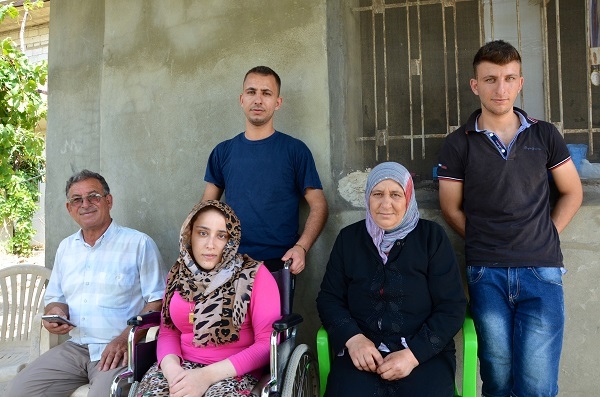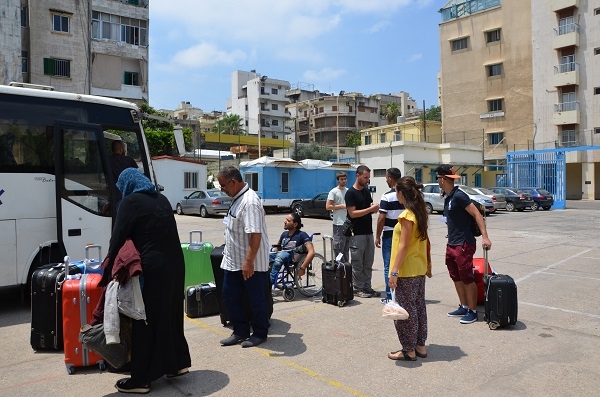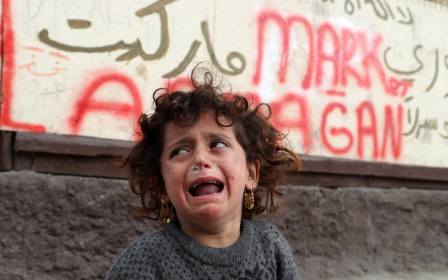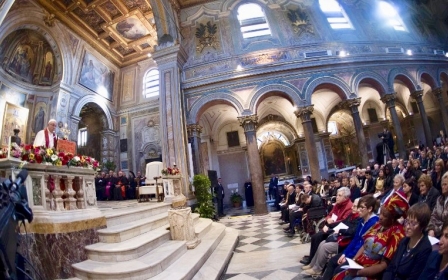First Syrian refugees arrive in France under deal with Christian NGOs
BEIRUT - The first group of vulnerable Syrian and Iraqi refugees to be resettled in France under a new Christian-led humanitarian scheme has landed in Paris before being resettled across the country.
The so-called humanitarian corridor scheme, which is organised by five Christian organisations and aims to provide an alternative to undertaking perilous sea journeys across the Mediterranean, saw 13 Syrian and three Iraqi refugees embark on Wednesday on a trip that will change their lives.
They set off from the parking lot of the Saint Gregoire school of Beirut. Among them was Nasr Alzhouri, a 59-year-old veterinarian from Homs in Syria. “We are turning a new page,” he told Middle East Eye. "We packed some clothes and a cooking machine to make kebbe for our children. I don’t know if they have this in France."
Next to him, fellow refugee Nasri, who asked MEE not to use his real name as he still has family in Syria, stood close to his wife and son. He is carrying a fishing rod on his back. “I love fishing. When I am in France, far from the war, I hope I will go fish by the sea,” he added.
Humanitarian corridors
The refugees who set off this week are small in number, but they are the first of 500 refugees in total heading to France under the new humanitarian corridor scheme, a unique partnership between the French government and five Christian NGOs, including Vatican-sponsored community organisation Sant’Egidio and the Protestant Federation of France.
The groups signed an agreement with former president François Hollande in March, which will see the last of the 500 refugees leave Lebanon for France by the end of 2018.
'I love fishing. When I am in France, far from the war, I hope I will go fish by the sea'
- Nasri, Syrian refugee
Although the organising NGOs are Christian, they say refugees are not selected on faith grounds and the first group, which is mostly made up of families and people with disabilities, includes Christians and Muslims.
Instead the NGOs say the refugees are selected according to the vulnerability criteria list set out by the European Union and their willingness to integrate in France. The first group is made up of six Christians and seven Muslims. And unlike some other European refugee schemes, the NGOs behind the humanitarian corridor scheme plan to cover 100 percent of the operation’s costs through private donations.
“We are not taking a single euro from the French state - the authorities simply help us with timing. When the families arrive in France, the state’s only commitment is to grant them refugee status within three months. From that point on, they will have the same [work and welfare] rights as any French citizen,” Valerie Regnier, head of Sant’Egidio in France, told MEE.
Upon arrival in France, where the refugees are being resettled in the towns of Pau, Le Mans, Le Havre and Combas, Sant’Egidio and the partner NGOs aim to ensure the refugees are hosted by a network of families and volunteers who will provide them with free housing and support for their first year in the country. Sant’Egidio estimates the cost of the operation at about $18,000 per year for a family with two children.
Speaking to MEE before their flight to France, the refugees in Beirut were already making plans for the future. “I was a cook at the Four Seasons hotel in Damascus. My priority is to learn French, find a job and maybe one day open an oriental restaurant,” said Rami, who asked MEE not to use his real name as he still has family in Syria. He fled Syria with his parents in 2015, when their village of Al Qarayatayn fell into the hands of the Islamic State (IS) group.
“The most important [thing] for me is that my children get an education,” said Nasr Alzhouri. Back in Syria, one of his sons was killed on his way to university. The Alzhouri family also hopes their 21-year-old daughter Basilah, who suffers from spina bifida - a genetic spinal defect that can cause bladder dysfunction, loss of hand coordination, hearing and sight - will receive medical assistance.
The Italian precedent
France is the second country in Europe, after Italy, where Sant’Egidio has launched the humanitarian corridor scheme. The Italian scheme went into operation last year and aims to resettle 1,500 refugees by the end of 2018. More than 800 refugees have already arrived in Italy.
The group is now in discussions with European governments over opening new humanitarian corridors with the governments of Spain, Belgium, Holland, Germany and Poland.
Back in Lebanon at a refugee camp outside the village of Tas Abbas, NGO workers are sure that the scheme has saved lives.
“In 2015, the Syrian refugees from the camp started contacting smugglers to reach Europe by boat. At that time, we had heard that humanitarian corridors might open with Italy so we negotiated for the families to wait before risking their lives at sea. We then contacted Sant’Egidio and presented them with cases and it worked,” said Alessandro Ciquera, from Operazione Colomba, an Italian NGO.
He added: “Today about 100 people from our areas of operations have reached Italy.”
The Bakkar family was among the beneficiaries. One member travelled to Italy with his family and today, his brother Ahmad is leaving to France with his wife Marwa and their two young children.
“My brother tells me life in Italy is good. The most important for me is to leave this region. We have nothing left in Syria and I don’t want to live in a warzone any more. Over there in France, it will be a new life with a future for my children,” said Ahmad Bakkar, a former factory worker from Homs.
The work by Sant’Egidio in Lebanon has been welcomed by the United Nations High Commissioner for Refugees (UNHCR), the body responsible for organising the international aid to Syrian refugees as well as the resettlement programmes to Western countries.
“Our agency welcomes other resettlement pathways. We have met with Sant’Egidio Italy and assisted them in indicating the profiles they should look into. We have also had initial discussions with Sant’Egidio France," says Lisa Abou Khaled, spokesperson at UNHCR, which has resettled a total of 4,827 Syrian refugees in France since 2011.
Others, though, have sounded a note of caution over the possible agendas set by NGOs operating independently in the region.
“The scale of the Syrian crisis is unprecedented and humanitarian systems have failed to respond adequately. The UNHCR can’t do everything alone so if other NGOs can help, they should. My concern, however, is that every NGO has an agenda imposed by its donors,” said Dina Fahmi, former project officer at Mercy Corps Lebanon.
A diplomatic role?
Sant’Egidio, which is based in Italy and has 75,000 members worldwide, is more than just a provider of humanitarian assistance, though. Some go as far as calling Sant’Egidio the “informal diplomatic agency” of the Catholic church.
Over the past decades, the organisation has taken on a particularly active role in international diplomacy and conflict resolution in places such as Guatemala, Liberia and Kosovo. And last month it signed a formal cooperation agreement with the United Nations.
Later that month, it intervened in the Central African Republic and was able to broker a peace deal between 13 rebel groups.
In the case of Syria, however, peace talks brokered by the group in 2012 failed to have any discernible impact. “The migration crisis will not stop tomorrow, neither will the Syrian conflict, so there needs to be a unified European response to this. We need to tackle this issue at the root, at the Syrian borders, before people embark on death trips across the Mediterranean,” said Regnier.
New MEE newsletter: Jerusalem Dispatch
Sign up to get the latest insights and analysis on Israel-Palestine, alongside Turkey Unpacked and other MEE newsletters
Middle East Eye delivers independent and unrivalled coverage and analysis of the Middle East, North Africa and beyond. To learn more about republishing this content and the associated fees, please fill out this form. More about MEE can be found here.





